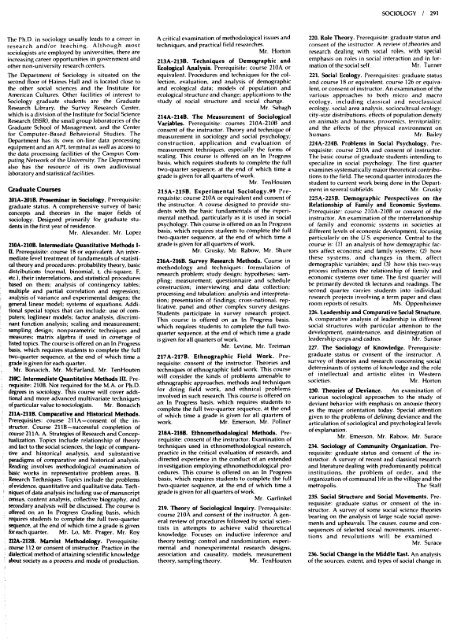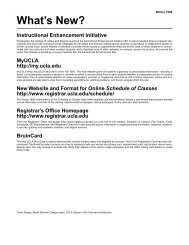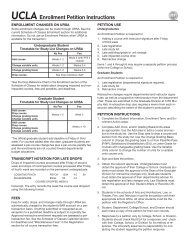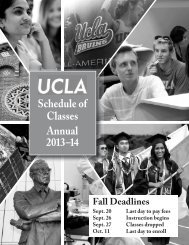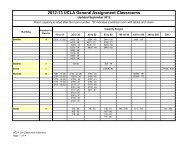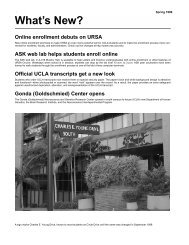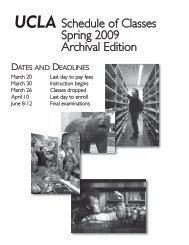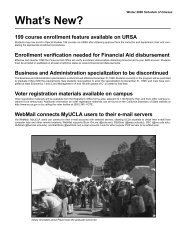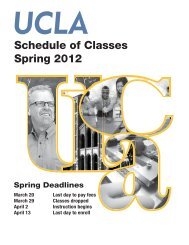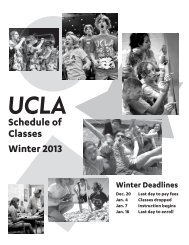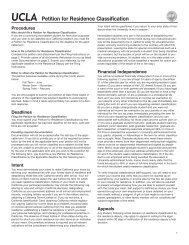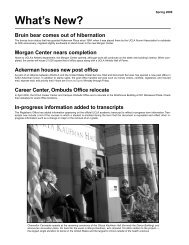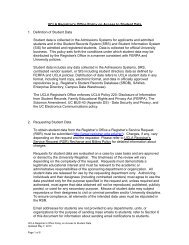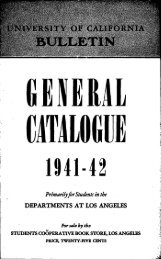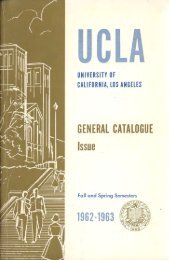UCLA Graduate Catalog 1980-81 - Registrar - UCLA
UCLA Graduate Catalog 1980-81 - Registrar - UCLA
UCLA Graduate Catalog 1980-81 - Registrar - UCLA
Create successful ePaper yourself
Turn your PDF publications into a flip-book with our unique Google optimized e-Paper software.
The Ph.D. in sociology usually leads to a career in<br />
research and/or teaching. Although most<br />
sociologists are employed by universities, there are<br />
increasing career opportunities in government and<br />
other non-university research centers.<br />
The Department of Sociology is situated on the<br />
second floor of Haines Hall and is located close to<br />
the other social sciences and the Institute for<br />
American Cultures. Other facilities of interest to<br />
Sociology graduate students are the <strong>Graduate</strong><br />
Research Library, the Survey Research Center,<br />
which is a division of the Institute for Social Science<br />
Research (ISSR), the small group laboratories of the<br />
<strong>Graduate</strong> School of Management, and the Center<br />
for Computer-Based Behavioral Studies. The<br />
Department has its own on-line data processing<br />
equipment and an APL terminal as well as access to<br />
the data processing facilities of the Campus Computing<br />
Network of the University. The Department<br />
also has the resource of its own audiovisual<br />
laboratory and statistical facilities.<br />
<strong>Graduate</strong> Courses<br />
201A-201B. Proseminar in Sociology . Prerequisite:<br />
graduate status . A comprehensive survey of basic<br />
concepts and theories in the major fields of<br />
sociology. Designed primarily for graduate students<br />
in the first year of residence.<br />
Mr. Alexander, Mr. Lopez<br />
210A-210B. Intermediate Quantitative Methods I-<br />
IL Prerequisite: course 18 or equivalent. An intermediate<br />
level treatment of fundamentals of statistical<br />
theory and procedures: probability theory, basic<br />
distributions (normal , binomial , t, chi-square, F,<br />
etc.), their interrelations, and statistical procedures<br />
based on them ; analysis of contingency tables;<br />
multiple and partial correlation and regression;<br />
analysis of variance and experimental designs; the<br />
general linear model; systems of equations. Additional<br />
special topics that can include: use of computers;<br />
loglinear models; factor analysis, discriminant<br />
function analysis ; scaling and measurement;<br />
sampling design ; nonparametric techniques and<br />
measures; matrix algebra if used in coverage of<br />
listed topics . The course is offered on an In Progress<br />
basis, which requires students to complete the full<br />
two-quarter sequence, at the end of which time a<br />
grade is given for each quarter.<br />
Mr. Bonacich, Mr. McFarland, Mr. TenHouten<br />
210C. Intermediate Quantitative Methods III. Prerequisite:<br />
2106 . Not required for the M.A. or Ph.D.<br />
degrees in sociology. This course will cover additional<br />
and more advanced multivariate techniques<br />
of particular value to sociologists . Mr. Bonacich<br />
211A-2118 . Comparative and Historical Methods.<br />
Prerequisites: course 211A- consent of the instructor<br />
. Course 211B-successful completion of<br />
course 211 A. A. Strategies of Research and Conceptualization.<br />
Topics include relationship of theory<br />
and fact to the social sciences, the logic of comparative<br />
and historical analysis , and substantive<br />
paradigms of comparative and historical analysis.<br />
Reading involves methodological examination of<br />
basic works in representative problem areas. B.<br />
Research Techniques. Topics include the problems<br />
of evidence, quantitative and qualitative data. Techniques<br />
of data analysis including use of manuscript<br />
census, content analysis, collective biography, and<br />
secondary analysis will be discussed. The course is<br />
offered on an In Progress Grading basis, which<br />
requires students to complete the full two-quarter<br />
sequence, at the end of which time a grade is given<br />
for each quarter. Mr. Lo, Mr. Prager, Mr. Roy<br />
212A-212B. Marxist Methodology . Prerequisite:<br />
course 112 or consent of instructor . Practice in the<br />
dialectical method of attaining scientific knowledge<br />
about society as a process and mode of production.<br />
A critical examination of methodological issues and<br />
techniques, and practical field researches.<br />
Mr. Horton<br />
213A-213B . Techniques of Demographic and<br />
Ecological Analysis. Prerequisite: course 210A or<br />
equivalent. Procedures and techniques for the collection,<br />
evaluation, and analysis of demographic<br />
and ecological data; models of population and<br />
ecological structure and change; applications to the<br />
study of social structure and social change.<br />
Mr. Sabagh<br />
214A -214B. The Measurement of Sociological<br />
Variables. Prerequisite: courses 210A-210B and<br />
consent of the instructor. Theory and technique of<br />
measurement in sociology and social psychology;<br />
construction, application and evaluation of<br />
measurement techniques, especially the forms of<br />
scaling. This course is offered on an In Progress<br />
basis, which requires students to complete the full<br />
two-quarter sequence, at the end of which time a<br />
grade is given for all quarters of work.<br />
Mr. TenHouten<br />
215A-215B. Experimental Sociology.99 Prerequisite:<br />
course 210A or equivalent and consent of<br />
the instructor. A course designed to provide students<br />
with the basic fundamentals of the experimental<br />
method, particularly as it is used in social<br />
psychology. This course is offered on an In Progress<br />
basis, which requires students to complete the full<br />
two-quarter sequence, at the end of which time a<br />
grade is given for all quarters of work.<br />
Mr. Grusky, Mr. Rabow, Mr. Shure<br />
216A-216B. Survey Research Methods . Course in<br />
methodology and techniques: formulation of<br />
research problem; study design; hypotheses; sampling;<br />
measurement; questionnaire and schedule<br />
construction; interviewing and data collection;<br />
processing and tabulation; analysis and interpretation;<br />
presentation of findings; cross-national, replicative,<br />
panel and other complex survey designs.<br />
Students participate in survey research project.<br />
This course is offered on an In Progress basis,<br />
which requires students to complete the full twoquarter<br />
sequence, at the end of which time a grade<br />
is given for all quarters of work.<br />
Mr. Levine, Mr. Treiman<br />
217A- 217B . Ethnographic Field Work. Prerequisite:<br />
consent of the instructor. Theories and<br />
techniques of ethnographic field work. This course<br />
will consider the kinds of problems amenable to<br />
ethnographic approaches, methods and techniques<br />
for doing field work, and ethnical problems<br />
involved in such research. This course is offered on<br />
an In Progress basis, which requires students to<br />
complete the full two-quarter sequence, at the end<br />
of which time a grade is given for all quarters of<br />
work. Mr. Emerson, Mr. Pollner<br />
218A-218B. Ethnomethodological Methods. Prerequisite<br />
: consent of the instructor . Examination of<br />
techniques used in ethnomethodological research,<br />
practice in the critical evaluation of research, and<br />
directed experience in the conduct of an extended<br />
investigation employing ethnomethodological procedures.<br />
This course is offered on an In Progress<br />
basis, which requires students to complete the full<br />
two-quarter sequence, at the end of which time a<br />
grade is given for all quarters of work.<br />
219. Theory<br />
Mr. Garfinkel<br />
of Sociological Inquiry . Prerequisite:<br />
course 210A and consent of the instructor. A general<br />
review of procedures followed by social scientists<br />
in attempts to achieve valid theoretical<br />
knowledge. Focuses on inductive inference and<br />
theory testing: control and randomization, experimental<br />
and nonexperimental research designs,<br />
association and causality, models, measurement<br />
theory, sampling theory. Mr. TenHouten<br />
SOCIOLOGY / 291<br />
220. Role Theory . Prerequisite: graduate status and<br />
consent of the instructor. A review of;theories and<br />
research dealing with social roles, with special<br />
emphasis on roles in social interaction and in formation<br />
of the social self. Mr. Turner<br />
221. Social Ecology. Prerequisites: graduate status<br />
and course 1S or equivalent, course 126 or equivalent,<br />
or consent of instructor. An examination of the<br />
various approaches to both micro and macro<br />
ecology, including classical and neoclassical<br />
ecology, social area analysis, sociocultrual ecology,<br />
city-size distributions, effects of population density<br />
on animals and humans, proxemics, territoriality,<br />
and the effects of the physical environment on<br />
humans. Mr. Bailey<br />
224A-224B. Problems in Social Psychology. Prerequisite:<br />
course 210A and consent of instructor.<br />
The basic course of graduate students intending to<br />
specialize in social psychology. The first quarter<br />
examines systematically major theoretical contributions<br />
to the field. The second quarter introduces the<br />
student to current work being done in the Department<br />
in several subfields. Mr. Grusky<br />
225A- 225B . Demographic Perspectives on the<br />
Relationship of Family and Economic Systems.<br />
Prerequisite: course 210A-210B or consent of the<br />
instructor. An examination of the interrelationship<br />
of family and economic systems in societies at<br />
different levels of economic development, focusing<br />
particularly on the U.S. experience. Central to the<br />
course is: (1) an analysis of how demographic factors<br />
affect economic and family systems; (2) how<br />
these systems, and changes in them, affect<br />
demographic variables; and (3) how this two-way<br />
process influences the relationship of family and<br />
economic systems over time. The first quarter will<br />
be primarily devoted tk lectures and readings. The<br />
second quarter carries students into individual<br />
research projects involving a term paper and class<br />
room reports of results. Ms. Oppenheimer<br />
226. Leadership and Comparative Social Structure.<br />
A comparative analysis of leadership in different<br />
social structures with particular attention to the<br />
development, maintenance, and disintegration of<br />
leadership corps and cadres. Mr. Surace<br />
227. The Sociology of Knowledge . Prerequisite:<br />
graduate status or consent of the instructor. A<br />
survey of theories and research concerning social<br />
determinants of systems of knowledge and the role<br />
of intellectual and artistic elites in Western<br />
societies. Mr. Horton<br />
230. Theories of Deviance . An examination of<br />
various sociological approaches to the study of<br />
deviant behavior with emphasis on anomie theory<br />
as the major orientation today. Special attention<br />
given to the problems of defining deviance and the<br />
articulation of sociological and psychological levels<br />
of explanation.<br />
Mr. Emerson, Mr. Rabow, Mr. Surace<br />
234. Sociology of Community Organization. Prerequisite:<br />
graduate status and consent of the instructor.<br />
A survey of recent and classical research<br />
and literature dealing with predominantly political<br />
institutions, the problem of order, and the<br />
organization of communal life in the village and the<br />
metropolis. The Staff<br />
235. Social Structure and Social Movements. Prerequisite:<br />
graduate status or consent of the instructor.<br />
A survey of some social science theories<br />
bearing on the analysis of large scale social movements<br />
and upheavals. The causes, course and consequences<br />
of selected social movements, insurrections<br />
and revolutions will be examined.<br />
Mr. Surace<br />
236. Social Change in the Middle East. An analysis<br />
of the sources, extent, and types of social change in


